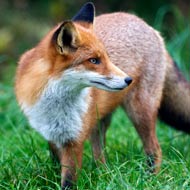Tougher fox-hunting laws needed in Scotland, review finds

The report concluded that greater consistency and clarity is needed in the legislation, and hunts should be made more transparent and accountable.
Fox hunting laws in Scotland should be tightened up and clarified, a review has found.
The review, led by Lord Bonomy, aimed to find out if the legislation is adequately protecting wild mammals, whilst allowing effective and humane control where necessary.
A report published on Monday (21 November) concluded that there is reason to suspect illegal hunts are still taking place. In addition, aspects of the legislation unduly complicate the detection, investigation and prosecution of alleged offences.
Lord Bonomy made a series of recommendations:
- Remove inconsistencies and inappropriate or unnecessary expressions in the legislation
- Appoint part-time, independent hunt monitors to randomly observe hunts using packs of hounds
- Develop a Code of Practice for hunt conduct, including a requirement to notify police in advance of a hunt, identities of those responsible for its activities, number of hounds, identities of guns, and provisions for conduct. This should be recorded in a log or register and form the basis of an annual report by Police Scotland
- Amend section 1, either to make it an offence to 'intentionally or recklessly' hunt a wild mammal with a dog; or to make a person who 'uses, or causes or permits, a dog to hunt' a wild mammal guilty of an offence
- Consider making it an offence for landowners to permit hunts to carry out illegal activities on their land
- Extend the time limit for bringing prosecutions
Receiving the report, Scottish environment secretary Roseanna Cunningham said: "The Scottish Government recognised concerns about whether the legislation on fox-hunting is working properly – that is why we asked Lord Bonomy to carry out this detailed work.
"Back in 2002, Scotland led the way in addressing animal welfare concerns and we remain committed to ensuring the highest levels of welfare for our wild animals."
The government will now consider the findings and plans to respond in 2017.



 The Veterinary Medicines Directorate (VMD) is inviting applications from veterinary students to attend a one-week extramural studies (EMS) placement in July 2026.
The Veterinary Medicines Directorate (VMD) is inviting applications from veterinary students to attend a one-week extramural studies (EMS) placement in July 2026.